If you’ve dealt with tooth sensitivity before, you know just how frustrating it can be. When your teeth are sensitive, the foods and drinks you usually enjoy might be uncomfortable to consume. Luckily, tooth sensitivity can be managed with good oral hygiene and treatment from your dentist. At Mill Dam Dental Care, we help with tooth sensitivity in Virginia Beach, so our patients can eat and drink more comfortably. Let’s take a closer look at the causes and symptoms of tooth sensitivity, as well as ways to treat and manage this condition.
What is Tooth Sensitivity?
Tooth sensitivity is an extremely common dental condition that affects approximately one in eight American adults. It is characterized by a sharp, sudden pain when eating or drinking substances that are hot, cold, sweet, or acidic. Many patients describe tooth sensitivity as a sudden jolt or zap of pain.
Tooth sensitivity happens when our dentin tubules are exposed to certain foods. Dentin is the soft tooth layer below the enamel, and it is made up of highly sensitive nerve endings. Dentin can become exposed when the enamel is damaged or worn down, or when gum tissue recedes.
Symptoms of Tooth Sensitivity
The most common symptom of tooth sensitivity is discomfort when consuming hot, cold, sweet, or acidic items. Many people with tooth sensitivity also experience discomfort or even pain when breathing in during cold weather. Another common symptom of tooth sensitivity is discomfort when brushing and flossing teeth.
It’s important to note that tooth sensitivity symptoms vary between patients. For example, some patients may be sensitive to cold but not hot or vice versa. Some patients only experience mild discomfort, while others experience throbbing pain and may even have trouble chewing. Regardless of the severity of your symptoms, it’s important to talk to your dentist if you’re struggling with tooth sensitivity.
Causes of Tooth Sensitivity
There are many potential causes of tooth sensitivity. In some cases, tooth sensitivity is temporary and can be addressed easily, but in others, the sensitivity is the sign of an underlying condition. Here are some of the most common causes of tooth sensitivity.
- Enamel Wear and Tear. When your enamel wears down naturally, it leaves your dentin exposed, resulting in discomfort and even pain. There are a few things that might cause your enamel to wear down naturally. If you frequently eat highly acidic foods without brushing your teeth afterward, the acid will cause the enamel to slowly erode away. Counterintuitively, brushing your teeth too forcefully can also damage your enamel.
- Gum Recession. When your gums recede, it leaves the bottom section of your tooth exposed, resulting in sensitivity. Gum recession often happens as a result of gingivitis, which can be prevented with regular dental visits and good oral hygiene.
- Dental Procedures. Some dental procedures can leave your teeth feeling sensitive afterward. However, this sensitivity is usually temporary and will likely go away after a few days. Sensitivity is a particularly common side effect of teeth whitening procedures. To prevent this, teeth whitening should not be done more than once per year in most cases.
- Health Conditions. Underlying health conditions can sometimes cause additional tooth sensitivity. Oral conditions like cavities and damaged teeth typically cause some sensitivity, although they can be treated. Digestive conditions like GERD and eating disorders like bulimia can also cause tooth sensitivity. This is because the teeth are exposed to more stomach acid than normal, which wears away the enamel.
- Genetics. Unfortunately, tooth sensitivity is often at least partially genetic. This means that if your parents struggle with sensitive teeth, you’re more likely to experience this as well. If you know that dental issues run in your family, you may be able to prevent them with good oral hygiene habits and regular visits to the dentist.
Tooth Sensitivity Treatments
There are a variety of ways to treat and prevent tooth sensitivity so you can eat and drink more comfortably. Here are some of the best ways to treat tooth sensitivity.
- Desensitizing Toothpaste. One of the easiest ways to minimize tooth sensitivity is to switch to a desensitizing toothpaste like Sensodyne. These toothpastes contain ingredients to protect your nerves and minimize pain. Use this toothpaste with a soft-bristle toothbrush and brush gently to reduce irritation and damage to your enamel.
- Better Hygiene. Mild tooth sensitivity can be managed by improving your oral hygiene and making some lifestyle changes. Start by cutting back on acidic foods like citrus fruits, tomato sauce, and pickles and generally eating a balanced diet. Make sure you are gently brushing and flossing every day, and avoid smoking or excessive drinking, both of which can have a negative effect on your oral health.
- Professional Treatments. If your tooth sensitivity is causing you pain or making it difficult to eat, don’t hesitate to talk to your dentist to find a solution. They will determine the underlying cause of your sensitivity and develop a treatment plan to address the problem. Professional fluoride treatments are particularly helpful for tooth sensitivity. In addition to fluoride treatments in the office, your dentist may prescribe fluoride to use at home. If your sensitivity is due to gum recession or cavities, your dentist will also recommend a treatment to address these issues, such as fillings, sealants, or gum grafts.

Treat Your Tooth Sensitivity at Mill Dam Dental Care
Don’t let tooth sensitivity stop you from eating the foods you love. This condition is incredibly common, and there are many treatments available to help you live more comfortably. At Mill Dam Dental Care, we offer a variety of treatment options to help with tooth sensitivity in Virginia Beach. Our caring and supportive team will determine what’s causing the sensitivity and find the most effective way to treat it. We even offer sedation dentistry and other specialized care to keep you comfortable in the dentist’s chair. Reach out today to schedule your appointment or learn more about our services.

